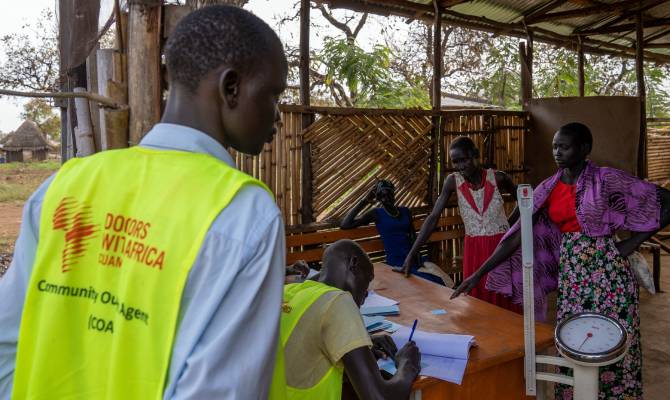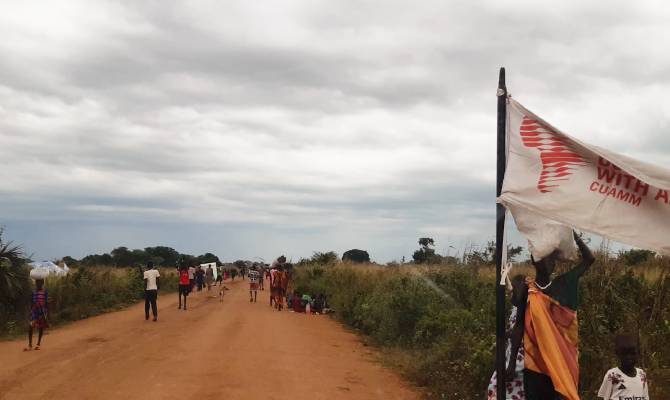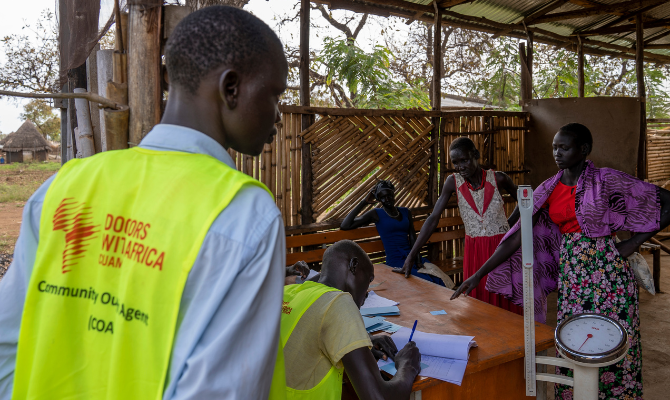“The training I took not only strengthened my ability to serve but also empowered me to protect my own family. I have learned, I have grown and I have found strength in the support and commitment CUAMM has shown to my people. For that, I am deeply grateful” Ruey Tut Pal is a South Sudanese Refugee living in Ngunyyiel Refugee camp. In 2020 he took part in health trainings offered by CUAMM and joined the team as a Community Health Worker, soon after he became a Supervisor. “Working with CUAMM alongside both national and international teams have shaped me in ways I never imagined” he claimed.
Located in southwestern Ethiopia near the South Sudanese border, Gambella region has hosted a large number of mostly South Sudanese refugees since 2014. Today, more than 395,000 refugees are living in seven camps, including Ngunyyiel.

In this camp, CHWs conduct daily house-to-house visits to deliver key health messages, assess children’s vaccination status, remind families about critical health appointments such as immunization and antenatal care (ANC), and trace defaulters children and pregnant women who have missed their scheduled care. They also identify children who have never been vaccinated and link them to the immunization services. In collaboration with healthcare workers, they support outreach vaccination campaigns to reach unserved populations.
“One of their most impactful initiatives is the Tea Talk Sessions – said Daniel Frau, CUAMM Area Manager in Gambella. Twice a week, these community gatherings which are predominantly attended by pregnant and lactating women offer a platform for health education, feedback collection, and community dialogue. During these sessions, CHWs, midwives, and nutrition officers identify unvaccinated children, women missing ANC visits, and screen for malnutrition”.
Community Health Workers – CHWs are an essential pillar in delivering and sustaining primary health care services among refugees. By living and working within the community, CHWs are often the first to recognize signs of illness or complications in pregnant women and children and can therefore help overcoming the first delay, the delay in seeking care which is a major contributor to preventable maternal and child deaths. Their early intervention ensures that health conditions are addressed before they become severe, reinforcing the principle that prevention and early detection are more effective than curative care. This frontline presence has significantly contributed to reducing maternal and child morbidity and mortality in Nguneyyiel Refugee Camp.
“CHWs have always played a key role in CUAMM’s interventions in the region. They have always been selected from within the refugee community and this has proven to be strategic and effective approach due to the fact cultural and linguistic familiarity make the CHW’s are more likely to be accepted and respected, leading to greater community engagement to the project intervention” stated Daniel Frau.
Over the past 5 years, more than 500 CHWs have been trained by CUAMM in health-related issues to better serve the refugee populations in the bordering region of Gambella. Currently, 60 trained CHWs are deployed in Nguenyyiel refugee camp as part of the team serving in the “Emergency response to the South Sudanese crisis through an integrated and inclusive approach in health, nutrition and protection” project which is supporting two health posts located in the camp.
The contributions of CHWs have been instrumental to the success of CUAMM’s primary health care interventions in the Ngunyyiel refugee camp. Their close connection with the community, consistent engagement, and ability to mobilize and educate residents have made health services more accessible and effective. The progress made in disease prevention, maternal and child health, and immunization coverage in Nguneyyiel would not have been possible without the tireless efforts of the Community Health Workers.





